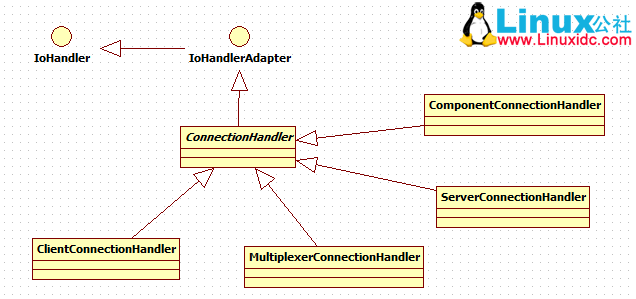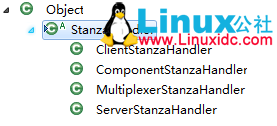共计 10837 个字符,预计需要花费 28 分钟才能阅读完成。
| Class containerClass = loader.loadClass("org.jivesoftware.openfire.XMPPServer"); | |
| containerClass.newInstance(); |
- 初始化配置参数
- 检查是否需要安装
- 初始化 Module
- 启动统计模块
- 启动 plugin
| if (!setupMode) {verifyDataSource(); | |
| // First load all the modules so that modules may access other modules while | |
| // being initialized | |
| loadModules(); | |
| // Initize all the modules | |
| initModules(); | |
| // Start all the modules | |
| startModules();} |
| public interface Module {/** | |
| * Returns the name of the module for display in administration interfaces. | |
| * | |
| * @return The name of the module. | |
| */ | |
| String getName(); | |
| /** | |
| * Initialize the module with the container. | |
| * Modules may be initialized and never started, so modules | |
| * should be prepared for a call to destroy() to follow initialize(). | |
| * | |
| * @param server the server hosting this module. | |
| */ | |
| void initialize(XMPPServer server); | |
| /** | |
| * Start the module (must return quickly). Any long running | |
| * operations should spawn a thread and allow the method to return | |
| * immediately. | |
| */ | |
| void start(); | |
| /** | |
| * Stop the module. The module should attempt to free up threads | |
| * and prepare for either another call to initialize (reconfigure the module) | |
| * or for destruction. | |
| */ | |
| void stop(); | |
| /** | |
| * Module should free all resources and prepare for deallocation. | |
| */ | |
| void destroy();} |
| // Load this module always last since we don't want to start listening for clients | |
| // before the rest of the modules have been started | |
| loadModule(ConnectionManagerImpl.class.getName()); |
| private final ConnectionListener clientListener; | |
| private final ConnectionListener clientSslListener; | |
| private final ConnectionListener boshListener; | |
| private final ConnectionListener boshSslListener; | |
| private final ConnectionListener serverListener; | |
| private final ConnectionListener componentListener; | |
| private final ConnectionListener componentSslListener; | |
| private final ConnectionListener connectionManagerListener; // Also known as 'multiplexer' | |
| private final ConnectionListener connectionManagerSslListener; // Also known as 'multiplexer' | |
| private final ConnectionListener webAdminListener; | |
| private final ConnectionListener webAdminSslListener; |
- client:表示客户端连接
- bosh:就是 HTTP 绑定的连接
- server:服务器到服务器的 socket 连接
- component:组件到服务器的连接
- connectionManager:是指通过 connectionManager 连接器过来的连接
- webAdmin:是指 web 控制台的连接
| if (getType() == ConnectionType.SOCKET_S2S ) | |
| {connectionAcceptor = new LegacyConnectionAcceptor(generateConnectionConfiguration() ); | |
| } | |
| else | |
| {connectionAcceptor = new MINAConnectionAcceptor(generateConnectionConfiguration() ); | |
| } |

| StanzaHandler createStanzaHandler(NIOConnection connection) {return new ClientStanzaHandler(XMPPServer.getInstance().getPacketRouter(), connection); | |
| } |
| public void sessionOpened(IoSession session) throws Exception {// Create a new XML parser for the new connection. The parser will be used by the XMPPDecoder filter. | |
| final XMLLightweightParser parser = new XMLLightweightParser(StandardCharsets.UTF_8); | |
| session.setAttribute(XML_PARSER, parser); | |
| // Create a new NIOConnection for the new session | |
| final NIOConnection connection = createNIOConnection(session); | |
| session.setAttribute(CONNECTION, connection); | |
| session.setAttribute(HANDLER, createStanzaHandler(connection)); | |
| // Set the max time a connection can be idle before closing it. This amount of seconds | |
| // is divided in two, as Openfire will ping idle clients first (at 50% of the max idle time) | |
| // before disconnecting them (at 100% of the max idle time). This prevents Openfire from | |
| // removing connections without warning. | |
| final int idleTime = getMaxIdleTime() / 2; | |
| if (idleTime > 0) {session.getConfig().setIdleTime(IdleStatus.READER_IDLE, idleTime); | |
| } | |
| } |
这样每一个 session 在打开时都会设置 handler,而具体的 handler 由各个派生类创建返回。这里的 StanzHandler 就是 Openfire 里的数据包处理单元。和 connection 类型一样,包处理也是对应的几个类:

| public void messageReceived(IoSession session, Object message) throws Exception {// Get the stanza handler for this session | |
| StanzaHandler handler = (StanzaHandler) session.getAttribute(HANDLER); | |
| // Get the parser to use to process stanza. For optimization there is going | |
| // to be a parser for each running thread. Each Filter will be executed | |
| // by the Executor placed as the first Filter. So we can have a parser associated | |
| // to each Thread | |
| final XMPPPacketReader parser = PARSER_CACHE.get(); | |
| // Update counter of read btyes | |
| updateReadBytesCounter(session); | |
| //System.out.println("RCVD:" + message); | |
| // Let the stanza handler process the received stanza | |
| try {handler.process((String) message, parser); | |
| } catch (Exception e) {Log.error("Closing connection due to error while processing message:" + message, e); | |
| final Connection connection = (Connection) session.getAttribute(CONNECTION); | |
| if (connection != null ) {connection.close(); | |
| } | |
| } | |
| } |
在接收到数据包后获取到 StanzaHandler,然后调用了它的 process 方法,也就是让实际的包处理者去处理数据。这样就回到了 StanzeHanler,以 ClientStanzaHandler 为例子。只不过这个派生类中没有重写 process 方法,也就是说要看父类的实现:
| public void process(String stanza, XMPPPacketReader reader) throws Exception {boolean initialStream = stanza.startsWith("<stream:stream") || stanza.startsWith("<flash:stream"); | |
| if (!sessionCreated || initialStream) {if (!initialStream) { | |
| .......... | |
| // Found an stream:stream tag... | |
| if (!sessionCreated) {sessionCreated = true; | |
| MXParser parser = reader.getXPPParser(); | |
| parser.setInput(new StringReader(stanza)); | |
| createSession(parser); | |
| } | |
| .......... | |
| return; | |
| } | |
| .......... | |
| } |
由于代码较多,我省略了一些代码。看到这应该明白了吧,对于当前的连接没有创建 Openfire 的 session 对象时,会进行创建过程 createSession,对于不同的 StanzeHandler 会有些不一样,这里 ClientStanzaHandler 的实现就是把创建好的 session 放到本地的 LocalClientSession 中:
| boolean createSession(String namespace, String serverName, XmlPullParser xpp, Connection connection) | |
| throws XmlPullParserException {if ("jabber:client".equals(namespace)) {// The connected client is a regular client so create a ClientSession | |
| session = LocalClientSession.createSession(serverName, xpp, connection); | |
| return true; | |
| } | |
| return false; | |
| } |
| public ClientSession getSession(JID from) {// Return null if the JID is null or belongs to a foreign server. If the server is | |
| // shutting down then serverName will be null so answer null too in this case. | |
| if (from == null || serverName == null || !serverName.equals(from.getDomain())) {return null; | |
| } | |
| // Initially Check preAuthenticated Sessions | |
| if (from.getResource() != null) {ClientSession session = localSessionManager.getPreAuthenticatedSessions().get(from.getResource()); | |
| if (session != null) {return session; | |
| } | |
| } | |
| if (from.getResource() == null || from.getNode() == null) {return null; | |
| } | |
| return routingTable.getClientRoute(from); | |
| } |
先是获取本地的 session,如果能找到直接返回,找不到则跳到 routingTable 里获取客户端的路由信息。
| public ClientSession getClientRoute(JID jid) {// Check if this session is hosted by this cluster node | |
| ClientSession session = (ClientSession) localRoutingTable.getRoute(jid.toString()); | |
| if (session == null) {// The session is not in this JVM so assume remote | |
| RemoteSessionLocator locator = server.getRemoteSessionLocator(); | |
| if (locator != null) {// Check if the session is hosted by other cluster node | |
| ClientRoute route = usersCache.get(jid.toString()); | |
| if (route == null) {route = anonymouSUSErsCache.get(jid.toString()); | |
| } | |
| if (route != null) {session = locator.getClientSession(route.getNodeID().toByteArray(), jid); | |
| } | |
| } | |
| } | |
| return session; | |
| } |
这里更直接的可以看到,查找本地路由不 null 则会通过 RemoteSessionLocator 来完成。当然这里最大的奥秘其实是 usersCache 和 anonymousUsersCache 这两个 cache。之前写的集群源码分析中提过,最终 openfire 集群后会对缓存进行同步,这样每台服务器上都会有缓存的副本。所以 usersCache 是拥有所有��户信息的,有了 user 的信息就有了 jid 的信息,这样不管是哪台服务器都可以对数据包处理并发送给客户端。
| public Collection<ClientSession> getSessions() {return routingTable.getClientsRoutes(false); | |
| } |
其实就是访问路由表,因为路由表里有所有的 cache,和获取单个的 session 不一样,需要对所有的路由都遍历返回。
| public Collection<ClientSession> getClientsRoutes(boolean onlyLocal) {// Add sessions hosted by this cluster node | |
| Collection<ClientSession> sessions = new ArrayList<ClientSession>(localRoutingTable.getClientRoutes()); | |
| if (!onlyLocal) {// Add sessions not hosted by this JVM | |
| RemoteSessionLocator locator = server.getRemoteSessionLocator(); | |
| if (locator != null) {// Add sessions of non-anonymous users hosted by other cluster nodes | |
| for (Map.Entry<String, ClientRoute> entry : usersCache.entrySet()) {ClientRoute route = entry.getValue(); | |
| if (!server.getNodeID().equals(route.getNodeID())) {sessions.add(locator.getClientSession(route.getNodeID().toByteArray(), new JID(entry.getKey()))); | |
| } | |
| } | |
| // Add sessions of anonymous users hosted by other cluster nodes | |
| for (Map.Entry<String, ClientRoute> entry : anonymousUsersCache.entrySet()) {ClientRoute route = entry.getValue(); | |
| if (!server.getNodeID().equals(route.getNodeID())) {sessions.add(locator.getClientSession(route.getNodeID().toByteArray(), new JID(entry.getKey()))); | |
| } | |
| } | |
| } | |
| } | |
| return sessions; | |
| } |
CentOS 下 Openfire 详细安装过程 http://www.linuxidc.com/Linux/2012-09/69539.htm
CentOS 5.4 下基于 Jabber/XMPP 协议的 Openfire 服务器配置笔记 http://www.linuxidc.com/Linux/2012-02/55497.htm
Ubuntu 12.04 安装 Openfire http://www.linuxidc.com/Linux/2012-07/64945.htm
Openfire 在使用 MySQL 数据库后的中文乱码问题解决 http://www.linuxidc.com/Linux/2014-03/97989.htm
通过 Nginx 实现 Openfire 集群的负载均衡 http://www.linuxidc.com/Linux/2015-09/122943.htm
Openfire 的详细介绍:请点这里
Openfire 的下载地址:请点这里
本文永久更新链接地址:http://www.linuxidc.com/Linux/2016-08/134021.htm
















